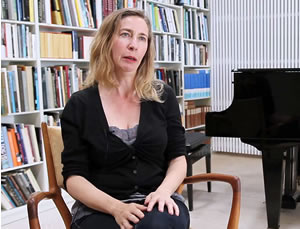De Amerikaanse dichteres, critica en uitgeefster Juliana Spahr werd geboren op 7 april 1966 in Chillicothe, Ohio. Spahr behaalde haar BA aan Bard College en haar PhD in Engels aan de Universiteit van Buffalo, The State University van New York. Ze heeft gedoceerd aan Siena College (1996-7), de Universiteit van Hawaï in Manoa (1997-2003), en Mills College (2003-). Samen met Jena Osman gaf van 1993 tot 2003 het kunsttijdschrift “Chain” uit. Spahrs deelname in de Occupy Movement in 2011 is opgetekend in haar 2015 boek “That Winter The Wolf Came.”Volgens Spahr zelf bracht ze wel tijd door in de kampementen en nam zij deel aan de protesten, hoewel zij en haar zoon “er nooit de nacht hebben doorgebracht.” In haar werk onderzoekt zij sociale kwesties, met inbegrip van de gevolgen van de BP olieramp, de wereldwijde impact van 9/11, het kapitalisme, en klimaatverandering. Ze maakt gebruik van poëzie als een mechanisme om de culturele erkenning en vertegenwoordiging te krijgen bij sociale bewegingen en politieke acties. Naar aanleiding van de Occupy-beweging, het neerschieten door de politie van Oscar Grant, Eric Garner en Mike Brown, en de 2009 California collegegeld wandelprotesten startte Spahr samen met Jasper Bernes en Joshua Clover het uitgeef-project “Commune Editions , Het project werd opgericht met de bedoeling om gedichten te publiceren als aanvulling op politieke actie. Spahr ontving de 2009 Hardison Poëzieprijs van de Folger Shakespeare Library.
Narrative
The water is blackish, green, and dark.
It gathers from its separated state, gathers from rain, gathers into stream.
It gathers in the mountain.
It gathers then travels, collects to become brackish.
Water travels, falls over a cliff, is falling.
Water is falling.
Falling onto rocks.
Because water falls it is.
Because water streams it is.
Because water collects into a pool it is narrative.
The pool is cold.
The pool is sheltered from sun by a cliff.
The pool is filled with rocks.
Water gathers over rocks, on rocks.
Moss gathers over rocks, on rocks.
Three arrive at this scene.
This scene where water is cold.
Where rocks are mossy.
When the three enter the pool their feet slip on rocks that are mossy.
As they slip, they slip deeper into water.
Slip on mossy coldness.
Slip into water so cold it makes their chest close.
Slip deeply in.
Water gathers them, gathers them by their slipping.
Water covers them.
Because water is brackish it is narrative.
Because water is brackish they don’t open their mouths.
Because water is brackish they are closed in their immersion.
They do immerse.
But they don’t open as they swim to falling water.
They stand beneath falling water.
Water beats down on them.
Beats on their shoulders.
Beats on their heads. Beats on them.
They stand beneath water that is a roar of a falling.
They stand in roar, in narrative.
But water is brackish.
So they do not kiss.
Do not open their mouth beneath the waterfall.
They let brackish water fall over them.
Over their heads.
Over their lips.
Over their eyes.
Over their ears.
Over their hands which they hold up to feel the roar landing into their palms.
Down their body.
Brackish water.
Closed bodies.
Water gathers them to this place, this narrative place.
Water covers them and they are covered with brackish water.
They do immerse.
They don’t open.
Immersion seals them off.
There is no open mouth.
No opening.
No exchanging.
Because it is brackish it is narrative falling over them.
It falls over.
It falls over them.
Sealed yet together.
They have come together with brackish.
They have let brackish wash over then even if they don’t let it inside.
Because water falls it is narrative.
Because they are immersed it is narrative.
Because they love each other while separated it is narrative.
Because the rocks are slippery with green moss it is narrative.
Because they slip on the rocks it is narrative.
Because they slip deeper into water.
Because they allow the slip, are prepared for the slip and love its immersion it is narrative. Because it involves love it is narrative.
Because it leaves them alone it is narrative.

Juliana Spahr (Chillicothe, 7 april 1966)
